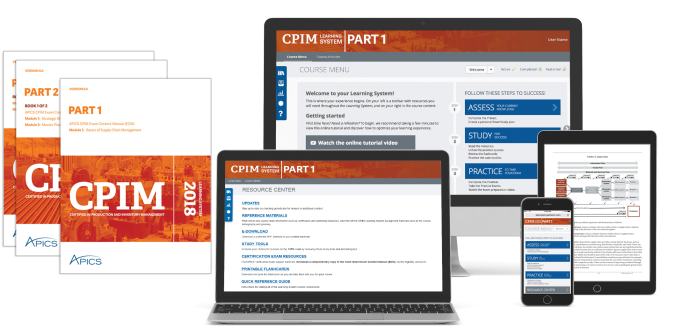
For the most part of my career, I have been known to be an active member of the APICS community. This means that, quite frequently, I interact with SCM practitioners and ERP consultants from different industries and with different professional backgrounds. During discussions, I am often asked what ways are best to acquire more in-depth-knowledge of the SCM/ERP domains.
Drawing from my 9 years of extensive, hands-on experience in the fields of Supply Chain Management and SAP ECC ERP implementation/support within the Pharmaceutical and FMCG industries, and a unique techno-functional skill set in SCM enabling technologies and Domain Expertise in the SAP PP/PP-PI module, I have compiled some advice for others.
When reflecting on numerous SAP ERP implementation/improvement projects, I keep falling back on the certainty and solidarity of the APICS certification: Certified in Production and Inventory Management (CPIM) which I believe was one of the main factors that led to my implementation success. Here are five reasons why I believe the APICS CPIM is a must for every ERP user and consultant:
- It harnesses your talents: It is widely believed that a lack in SCM talent is the reason behind many ERP implementation failures or less than optimal ERP performances – both the user/consultant sides. And while there is no one-size-fits-all kind of advice, the APICS CPIM certification has so many benefits to both users/consultants that I almost always advise people to pursue APICS CPIM because it is more about getting the best ROI of an ERP implementation.
- It follows a process-orientated approach: ERP commercial packages are all built to computerise the classical value chain activities of a company. These value chain activities are resembled in the modular structure that all commercial ERP packages follow. For example, business processes relating to Supply Chain Planning including, Sales and Operations Planning, Demand Management, Production Planning/Scheduling would be found under the Production Planning “PP/PP-PI” module in SAP ECC ERP. Likewise, other business process compromising a company’s value chain would be found as “canned” business processes across different modules of an ERP solution. The CPIM follows a process orientated approach to Supply Chain planning in a fashion that’s is almost identical to what is found in a SCM/Manufacturing Modules of and ERP package. This strategic fit between how ERP systems are structured and the process-oriented structure of the CPIM courseware is what makes CPIM the most powerful framework for SCM/ERP professionals in both user/consultant roles.

Australasian Supply Chain Institute offers the CPIM Learning System for self study or together with Guided Learning sessions, available right across Australia
- It mirrors the same language as your ERP: The concepts and terminology of an SCM/Manufacturing module of an ERP system, such as MPS/MRP, BOM, phantom assemblies, time fences and forecast consumption techniques, just to name a few, that prove tricky for most users/consultants to grasp are explored in-depth in the CPIM courseware in an a clear and easy to follow approach with plenty of real life examples. This helps to better utilise system functionalities/features that are likely to be ignored due to the lack of underrating of such concepts.
- It builds confidence to apply a configuration effort: CPIM equips designees with knowledge that proves critical to guide system configuration efforts in the SCM area.
- It results in better, more streamlined implementations and a higher ROI for digital transformation efforts: Many companies the likes of BASF, DuPont and Intel have adopted APICS frameworks which helped them achieve organisational goals and increase the efficiency of their systems and people. It’s why over 110,000 other SCM practitioners around the world have attained the CPIM. Now it’s up to you. https://www.apics.org/apics-for-business/customer-stories
By Hatem Abu Nusair, M.Sc. Engineering, CPIM-F, CSCP-F, SAP Certified Application Associate, APICS Master Instructor

Hatem is a Global Supply Chain Management & ERP Expert. He is currently the Production Planner at Tip Top, one of GWF’s divisions in Sydney, having moved from Jordan where he worked for a blue-chip international company that grew rapidly. Here, Hatem founded the Regional Middle East & North Africa (MENA) Supply Chain Department with the purpose of optimising Supply Chain performance across 13 subsidiaries through demand management and forecasting, capacity management, inventory control, and special projects, which entails: IT initiatives, ERP implementation, re-engineering of Supply Chain processes and other relevant matters.
Hatem is a qualified Industrial Engineer and a Master of Manufacturing Engineering candidate at UNSW. He is a Certified Fellow in Production and Inventory Management (CPIM-F) by APICS, a Certified Fellow Supply Chain Professional (CSCP-F) by APICS and a Certified Application Associate by SAP SE.
Hatem will be facilitator for Term 4 CPIM Part 2 Guided Learning for Australasian Supply Chain Institute where will be share his passion of streamlining supply chain processes, eliminating redundancies and utilising enabling technology to achieve operational goals with CPIM Part 2 students.